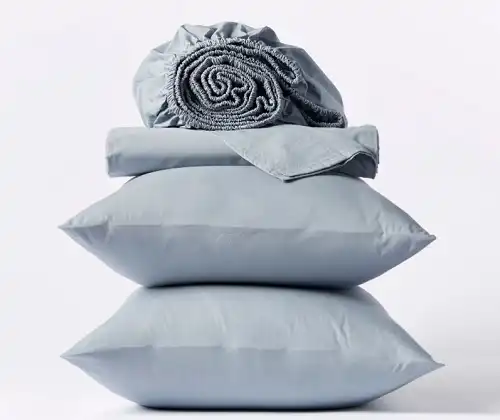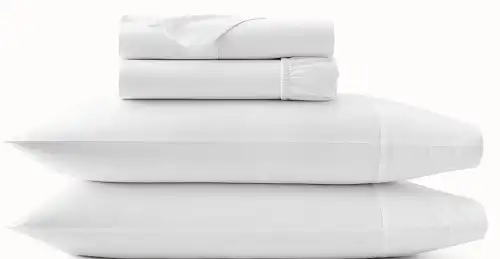- You are here:
- Home »
- Organic Bedding »
- Are Bed Sheets Toxic?
Are Bed Sheets Toxic?
As an Amazon Associate I earn from qualifying purchases.
When it comes to creating a cozy and comfortable sleep environment, one of the most critical elements is undoubtedly your bed sheets.
We invest in high-quality mattresses and carefully selected pillows, but what about the often-overlooked component – the bed sheets themselves? Are they toxic? Could they be compromising our health and well-being without our knowledge?
In this article, we delve into the world of bed sheets to explore whether they can be sources of hidden toxicity. We will examine the potential chemicals involved, their associated health risks, and the measures we can take to ensure a safe and restful night’s sleep.
Toxic Chemicals in Bed Sheets
When we talk about the potential toxicity of bed sheets, it’s essential to consider the chemicals used in their production and the potential health risks associated with these chemicals. Here are some of the key chemicals to be aware of:
- Dyes and Pigments: The vibrant colors and patterns of bed sheets are often achieved through dyeing processes. Some dyes can contain heavy metals and AZO compounds, which are known to be potentially harmful. Cheaper sheets may be more likely to use low-quality dyes.
- Bleach: Bleaching agents are commonly used in the production of white bed sheets. The most common type is chlorine bleach, which can release harmful byproducts into the air during use.
- Flame Retardants: Flame retardants are used in some bedding products, including sheets, to meet fire safety standards. However, many of these chemicals have been linked to health concerns, including hormonal disruption and developmental issues.
- Phthalates: These chemicals are commonly used as softeners in plastic and can be found in some waterproof bed sheets. Phthalates have been linked to reproductive issues and other health concerns.
- Pesticide Residues: In the case of non-organic cotton sheets, there’s a potential risk of pesticide residues. Conventional cotton farming relies heavily on pesticides and herbicides, which can linger in the finished products.
- Formaldehyde and Other Finishing Chemicals: Formaldehyde is often used in the textile industry as a finishing agent to prevent wrinkles and shrinkage. It’s a known irritant and potential carcinogen.
- Microplastics: Microplastics are tiny plastic particles that can be found in some synthetic fabrics like polyester and nylon. These particles can shed from the fabric and enter our bodies through skin contact or inhalation.
- Volatile Organic Compounds (VOCs): VOCs are chemicals that can be found in some bed sheets, including those made from synthetic materials. They’re slowly released into the air and can cause irritation, headaches, and other health issues.

Harmful Effects of Toxic Bed Sheets
Now that we’ve identified some of the potentially harmful chemicals found in bed sheets, let’s explore the adverse effects they can have on our health:
- Skin Irritation: Bed sheets treated with dyes, chemicals, or finishes can cause skin irritation, leading to rashes, itching, or other skin problems, especially for individuals with sensitive skin.
- Allergies: Some individuals may experience allergic reactions to the chemicals present in bed sheets, leading to symptoms like sneezing, congestion, or even asthma exacerbation.
- Respiratory Issues: For individuals with respiratory conditions like asthma, the off-gassing of chemicals from bed sheets can worsen their symptoms.
- Long-Term Health Concerns: Prolonged exposure to toxic bed sheets may result in more severe health issues over time. While it’s challenging to pinpoint a direct link, reducing exposure to potential toxins is generally recommended for overall health and well-being.
Organic and Safe Alternatives to Traditional Bed Sheets
To mitigate the potential risks associated with toxic bed sheets, consider opting for organic and safe alternatives. These products are specifically designed to minimize chemical exposure and promote a healthier sleeping environment.
Take a look at some options worth considering:
Coyuchi
Coyuchi is a brand known for its commitment to organic and sustainable bedding. Their products are GOTS (Global Organic Textile Standard) certified, ensuring that they meet stringent organic and environmental standards.
Coyuchi offers a wide range of organic bed sheets, including those made from pure organic cotton, linen, and other natural materials. These products are free from harmful chemicals and dyes, making them a safe and eco-friendly choice for your bed.
Magnolia Organics
Magnolia Organics is another brand that offers GOTS-certified organic cotton bed sheets. They also use low-impact dyes, ensuring minimal chemical exposure.
This brand also offers a variety of styles and patterns, ensuring you can find the perfect organic bed sheets to match your bedroom decor.
Boll & Branch
Boll & Branch is another brand that offers organic cotton bed sheets made from GOTS-certified organic cotton. Their products are also free from toxic chemicals and dyes, ensuring a healthier sleep experience.
Additionally, Boll & Branch’s products are Fair Trade certified, meaning they meet ethical and environmental standards, making them an excellent choice for conscious consumers.
Read More: Best Organic Printed Sheets
Labeling and Certifications to Look For
When shopping for bed sheets or bedding products, it’s essential to pay attention to labeling and certifications to make informed choices:
- GOTS Certification: Look for the GOTS (Global Organic Textile Standard) certification on bed sheets. This certification ensures that the product meets rigorous organic and environmental criteria, including restrictions on the use of certain chemicals.
- OEKO-TEX Standard 100: This certification guarantees that textiles are free from harmful substances. While it’s not as comprehensive as GOTS for organic products, it can still provide assurance of safety.
- USDA Organic Seal: If you’re purchasing organic cotton bed sheets, look for the USDA Organic seal on the product. This seal ensures that the cotton used in the product meets strict organic standards.
- Organic and Non-Toxic Claims: Manufacturers may use labels like “organic” or “non-toxic.” However, it’s essential to verify these claims by checking for supporting certifications and transparent information about their materials and production processes.
Read More: What’s the Difference between OekoTex and GOTS?
Consumer Tips
To minimize potential exposure to toxic bed sheets and create a safer sleeping environment, here are some practical tips for consumers:
- Read Labels: Always check the labels and product descriptions for information on the materials used in the bed sheets. Look for GOTS certification, Oeko-Tex, USDA Organic, or other organic and non-toxic claims.
- Wash New Sheets: Before using new bed sheets, wash them according to the manufacturer’s instructions. This helps remove any residual chemicals from the manufacturing process and reduces potential exposure.
- Consider Organic Options: Invest in organic bed sheets and bedding products from trusted brands like Coyuchi or Magnolia Organics. These products are designed with safety and sustainability in mind.
- Avoid Synthetic Sheets: When possible, opt for natural materials like organic cotton, linen, bamboo, hemp or Tencel lyocell, instead of synthetic fabrics, such as polyester or microfiber, that may contain harmful chemicals.
- Avoid Silicone-Coated Sheets: Some bed sheets may be coated with silicone to make them feel softer. However, this coating can contain harmful chemicals, so it’s best to avoid them. To know for sure, check the product description or reach out to the manufacturer directly.
- Ventilate Your Bedroom: Ensure proper ventilation in your bedroom to minimize the concentration of chemicals in the air. This can help reduce the risks associated with off-gassing.
- Use an Organic Mattress Protector: If you’re concerned about chemicals in your mattress, consider using an organic mattress protector made from safe and natural materials.
- Use Non-Toxic Laundry Detergents: When washing your bed sheets, use non-toxic laundry detergents to avoid introducing additional potentially harmful chemicals into your bedding.
- Avoid Dryer Sheets: Drying sheets or fabric softeners may contain harmful chemicals. Consider using natural wool dryer balls instead to soften your bed sheets without the added chemicals.
- Wear organic pajamas: Consider wearing organic cotton or bamboo pajamas to minimize skin exposure to potential toxins.
- Educate Yourself: Stay informed about the latest research and developments in the textile industry. This can help you make more conscious choices when purchasing bedding products for your home.

Conclusion
In conclusion, the question of whether bed sheets are toxic is not a simple one to answer. It depends on various factors, including the type of bed sheets, the materials and chemicals used, and the individual’s sensitivity to these substances.
While there are potential risks associated with certain chemicals used in bed sheets, consumers can take proactive steps to minimize these risks and create a safer sleep environment.
One of the most effective ways to ensure the safety of your bed sheets is to choose organic and GOTS-certified options like those offered by Coyuchi. These products are designed to be free from harmful chemicals and provide a healthier and more sustainable choice for your bedroom.
When it comes to overall bedroom safety, it’s not just about bed sheets. Consider the entire sleep environment, including your mattress, pillows, and any other bedding products. Brands like Naturepedic, known for their organic mattresses, can help you create a toxin-free bedroom and comfortable sleep space.
Ultimately, while bed sheets might not be the first thing that comes to mind when considering the health and safety of your bedroom, they do play a crucial role. By being informed, choosing wisely, and taking practical precautions, you can enjoy a restful night’s sleep with the peace of mind that your bed sheets are contributing to your overall well-being.
Read More: How to Wash Organic Sheets?
About the Author Kamila Flieger
My name is Kamila, and I'm passionate about researching non-toxic, organic products for the home. I believe it's so important to create a safe and healthy environment for our families, and I enjoy helping others do the same.




